
Support Groups for Families of Addict – Healing Together in 2026
Addiction is a complex issue that affects not only the individual struggling with substance use but also their entire family. In Connecticut, families are facing increasing emotional strain due to addiction, with 63% of family members of addicts reporting significant distress. As the impact of addiction continues to grow, families are often left feeling overwhelmed, isolated, and unsure of how to navigate the challenges of supporting a loved one in recovery.
In 2026, support groups for families of addicts have become an essential resource for helping loved ones cope with the emotional toll of addiction. These groups provide a vital network of compassion, understanding, and shared experiences, offering families the tools they need to heal together. Whether you are looking for emotional support, coping strategies, or a community that truly understands your journey, Project Courage in Connecticut is here to guide you through the process with dedicated family support services.
Through support groups like Al-Anon, Nar-Anon, and others, families can build resilience, improve communication, and regain a sense of control over their lives. In this article, we’ll explore the benefits of joining a support group, the different types available in Connecticut, and how Project Courage can help families reclaim hope and start their healing journey.
Here is what we cover:
- Local Support Groups and Resources in Connecticut
- Types of Support Groups for Families of Addicts
- Benefits of Joining Support Groups for Families of Addicts
- Risks of Not Participating in Support Groups for Families of Addicts
- Finding the Right Support Group for Your Family
- Online vs In-Person Support Groups
- Understanding the Science of Addiction and How It Affects Families
- How Family Therapy Supports Addiction Recovery
- How to Talk to a Family Member About Addiction
- Understanding the Role of Codependency in Addiction
- FAQs
- Conclusion
Real people. Real support.
Seeking Help for Yourself or a Loved One?
Connect with our professionals to start the journey to recovery.
Call 860.388.9656 for immediate support.
Local Support Groups and Resources in Connecticut
For families in Connecticut dealing with addiction, knowing where to find the right resources is crucial. Support groups offer a lifeline, but local services and programs can make all the difference in your journey. Below are key support options available throughout Connecticut:
Local Support Groups in Connecticut:
- Al-Anon: With multiple chapters across Connecticut, Al-Anon offers support for families affected by alcoholism. Both in-person and virtual meetings are available for ease of access.
- Nar-Anon: This group focuses specifically on drug addiction, offering support to families of addicts. Connecticut hosts several local meetings, both in-person and online, for families seeking support.
- Families Anonymous: A group focused on supporting families affected by addiction of all kinds, including alcohol, drugs, and other behaviors. Local meetings are available in various cities across Connecticut.
- Project Courage’s Family Services: As a Connecticut-based organization, Project Courage offers personalized support programs, including therapy and group services for families. Our services are designed to help families understand addiction, rebuild communication, and foster healing.
For more information and a list of specific meetings in Connecticut, check our Support Group Options.
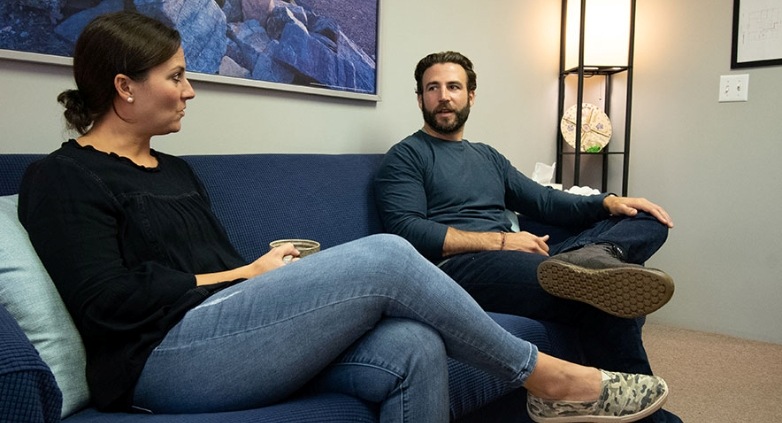
Types of Support Groups for Families of Addicts
While addiction takes its toll on the individual struggling with substance use, the impact extends far beyond.
Family members often carry a heavy burden, experiencing emotional strain, confusion, and feelings of helplessness. Fortunately, there’s a powerful resource available: support groups.
According to a 2024 study by the National Council on Alcoholism and Drug Dependence (NCADD), 78% of families reported feeling a significant improvement in their well-being after participating in support groups.
These groups offer a safe space to connect with others who understand the unique challenges of addiction, providing invaluable support on the path to recovery.
Here’s a look at some of the different types of support groups available for families of addicts:
1. Al-Anon
A foundational support system for families of alcoholics and addicts. Rooted in spirituality, Al-Anon promotes personal growth and fosters a sense of shared wisdom through regular open meetings.
- Focus: Support for families of alcoholics and addicts.
- Approach: Spiritual foundation, promoting personal growth and shared wisdom.
- Meetings: Regular, open meetings fostering a supportive environment.
2. Nar-Anon
Designed specifically for families struggling with a loved one’s drug addiction. Based on the 12-step program, Nar-Anon meetings provide a safe space to share experiences, find acceptance, and gain support on the path to recovery.
- Focus: Specifically designed for families of drug addicts.
- Approach: Based on the 12-step program, focusing on acceptance and recovery.
- Meetings: Provides a safe space for sharing challenges and triumphs.
3. Families Anonymous
Offers broader support for families dealing with any form of addiction. Emphasizing anonymity and shared experiences, Families Anonymous meetings encourage family involvement in recovery, fostering a sense of understanding and mutual support.
- Focus: Broader support for families dealing with various forms of addiction.
- Approach: Emphasizes anonymity, shared experiences, and mutual support.
- Meetings: Encourages family involvement in recovery, enhancing understanding and support.
4. Family Services Programs offered by Substance Abuse & Rehab Centers
Designed to support families affected by addiction, these programs provide comprehensive assistance that emphasizes education, support, and professional guidance. Rooted in a community-based approach, Family Services Programs help families develop a deeper understanding of addiction and foster resilience through a collaborative recovery process.
- Focus: Comprehensive support for families dealing with addiction.
- Approach: Community-based, emphasizing education, support, and professional guidance.
- Meetings: Includes educational sessions, support groups, and access to professional counseling, creating a supportive environment for family recovery.
Contact Project Courage for more information on joining a support group
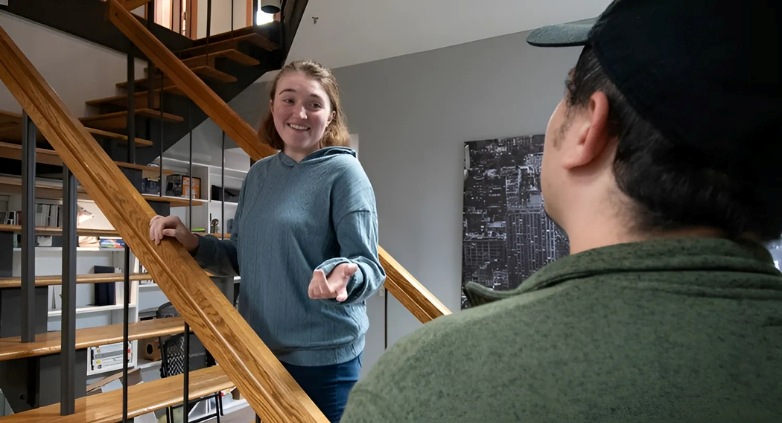
Benefits of Joining Support Groups for Families of Addicts
For families grappling with a loved one’s addiction, the journey can feel overwhelming. Isolation and emotional strain often become significant barriers to healing.
However, joining a support group can offer a powerful solution, extending far beyond simple emotional support.
A recent study found that 82% of families participating in support groups reported a significant increase in their sense of empowerment when dealing with addiction.
Support groups provide a unique space for families to not only share their burdens but also gain valuable tools and resources to navigate the recovery process effectively.
Here’s a closer look at the empowering benefits of joining a support group:
- Emotional Support: Share your journey in a supportive, understanding environment.
- Coping Strategies: Learn how to handle complex emotions and situations.
- Setting Boundaries: Develop skills to maintain healthy relationships.
- Self-Care: Prioritize your well-being to better support your loved one.
- Resources and Information: Access valuable resources to navigate the recovery process effectively.
Free Download
Proven Programs for Lasting Recovery
Receive your free guide to understanding alcohol addiction and discovering recovery programs tailored to you. Learn how to build a personal sobriety plan and get support every step of the way.
Risks of Not Participating in Support Groups for Families of Addicts
Standing by someone battling addiction can feel isolating.
Support groups offer a lifeline, but skipping them can lead to serious consequences.
A 2023 study by the National Alliance on Mental Illness (NAMI) found that families who did not participate in support groups were three times more likely to report experiencing clinical levels of anxiety and depression compared to those who did.
Without the support network and tools offered by groups, you might face:
- Isolation: Feeling alone in your struggles.
- Emotional Overwhelm: Difficulty managing emotions without support.
- Ineffective Coping: Relying on poor coping mechanisms that can exacerbate stress.
- Boundary Issues: Struggles with setting and maintaining healthy boundaries.
- Lack of Information: Missing out on valuable guidance and resources.
Call today for a confidential consultation on joining a support group
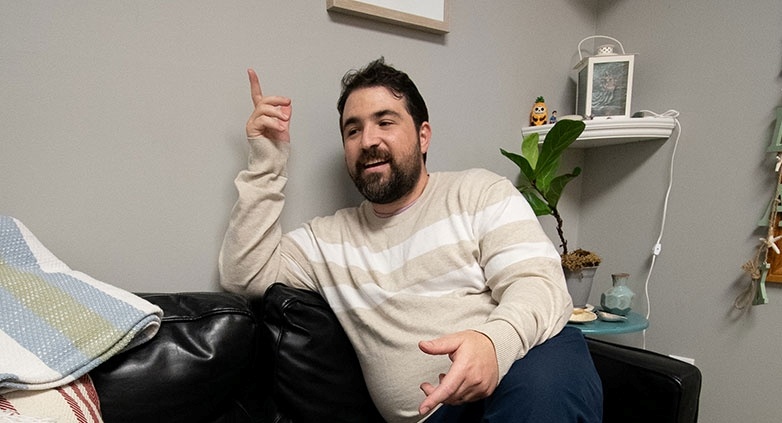
Finding the Right Support Group for Your Family
Support groups offer invaluable resources, but finding the right one is key.
Here’s what to consider:
- Know Your Needs: What are you hoping to gain? Sharing experiences? Coping skills?
- Research & Match: Look for groups aligned with your family’s values and specific needs (e.g., Al-Anon for families of alcoholics).
- Try It Out: Attend meetings to find a comfortable, welcoming environment.
- Virtual or In-Person: Choose the format that best suits your schedule and preferences.
Project Courage offers a variety of support group options specifically designed for families.
We provide a safe, supportive space for you to heal and connect with others on this journey.
Online vs In-Person Support Groups
When it comes to finding the right support group, one important decision is whether to attend virtually or in person. Both options offer meaningful support, but the right fit often depends on your lifestyle, emotional needs, and stage in the recovery process.

Online Support Groups
Virtual meetings have become increasingly popular, especially since 2020, offering families the chance to connect from the comfort of home. They are ideal for:
- Busy schedules or caregiving duties
- Those living in rural or underserved areas
- Anyone seeking privacy or emotional distance in early recovery
- Participants who may feel anxious about in-person sharing
Online groups still foster connection and can be a powerful entry point into ongoing family support. For some, these virtual spaces are a stepping stone toward deeper engagement through in-home or in-person services later on.
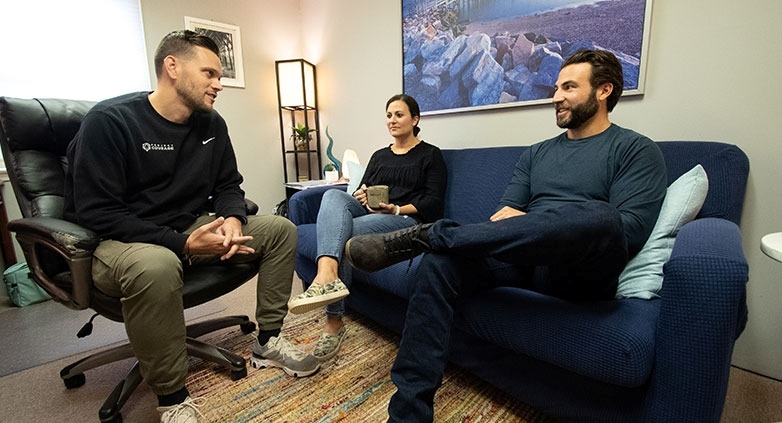
In-Person Support Groups
In-person meetings often provide a stronger sense of community and accountability. Being physically present with others can create:
- Deeper emotional bonds and shared trust
- More focused attention, without digital distractions
- Opportunities for informal support before and after meetings
Families who attend in-person sessions often report feeling more grounded and emotionally supported. And at Project Courage, we understand that showing up in person can sometimes mark a meaningful shift in a family’s healing journey.
Hybrid Options & Flexibility
Many families find that trying both formats helps them discover what works best. It’s okay to start small—whether that’s attending a Zoom meeting or showing up to a group in your area. You can also switch formats as your comfort level and circumstances change.
The key is not how you show up, but that you do. Whether online or in person, taking that first step toward support can transform how your family moves forward.
Project Courage offers both in-person and virtual support group options, designed with flexibility and family healing in mind. Reach out to explore what fits best for your situation.
Real people. Real support.
Seeking Help for Yourself or a Loved One?
Connect with our professionals to start the journey to recovery.
Call 860.388.9656 for immediate support.
Understanding the Science of Addiction and How It Affects Families
Addiction is not simply a matter of willpower; it’s a chronic disease that affects the brain and body. Understanding how addiction works can help family members develop empathy, set healthier boundaries, and provide effective support for their loved one’s recovery.
The Brain and Addiction:
Addiction alters the brain’s neurochemistry, leading to compulsive behaviors and an inability to control substance use. These brain changes affect decision-making, impulse control, and emotional regulation. Family members may witness behavior changes that feel out of character for their loved one, often leading to confusion and frustration.
Impact on Family Dynamics:
Addiction strains family relationships in profound ways. Communication breakdowns, emotional distance, and codependency are common in families of addicts. Understanding these dynamics helps families avoid enabling behaviors and focus on building supportive, healthy relationships.
Why Support Groups Matter:
Support groups provide families with the education and emotional tools to cope with the impact of addiction. By attending these groups, families gain a better understanding of addiction’s effects on their loved ones and themselves, allowing them to be more effective in supporting the recovery process.
For more information on the science of addiction and how it affects family members, visit Addiction is a Family Disease.
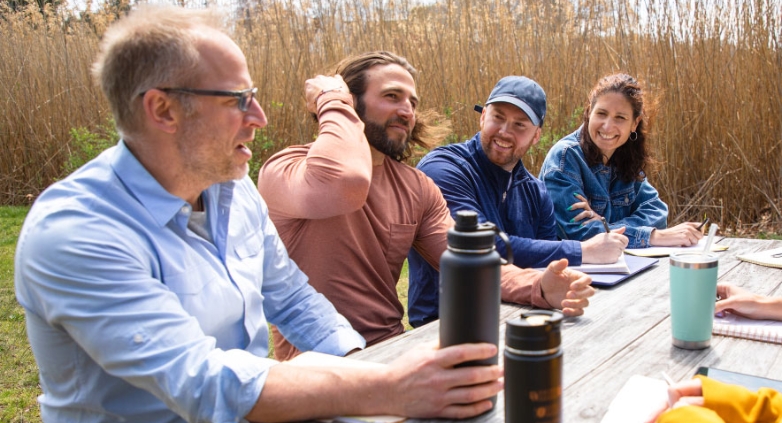
How Family Therapy Supports Addiction Recovery
While support groups are essential, family therapy plays a pivotal role in the addiction recovery process. It provides a structured environment for family members to address underlying issues, improve communication, and develop healthier coping strategies.
Why Family Therapy Matters:
- Rebuilding Trust: Addiction often leads to broken trust within families. Family therapy helps rebuild these trust issues through open dialogue and emotional healing.
- Understanding Addiction: Therapy helps family members understand the addiction cycle, enabling them to stop enabling behaviors and start supporting their loved one’s recovery journey.
- Strengthening Bonds: Addiction can divide families, but therapy brings family members together to share their experiences, express their feelings, and support each other.
Project Courage’s Approach to Family Therapy:
At Project Courage, we understand that addiction affects the entire family unit. Our family therapy programs are designed to address the unique challenges your family faces, offering both individual and group sessions for families dealing with addiction. Our goal is to create a supportive environment where all family members can heal and thrive.
For more information on family therapy options, visit Family Therapy for Addiction.
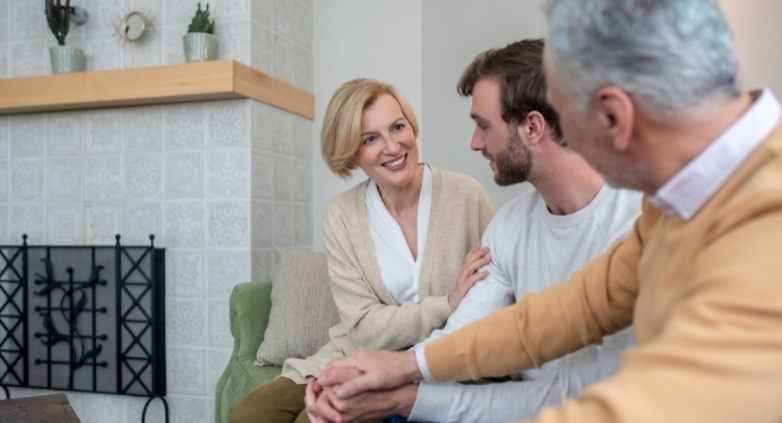
How to Talk to a Family Member About Addiction
Starting a conversation with a loved one about addiction can be intimidating. However, open communication is essential for recovery. Here’s how to approach the topic with sensitivity and care:
Starting the Conversation:
- Be Compassionate: Approach the conversation with empathy and avoid blaming or shaming your loved one. Let them know you’re there to support them, not judge them.
- Focus on Your Feelings: Use “I” statements to express how their addiction is affecting you (e.g., “I feel worried when I see you struggle”).
- Encourage Open Dialogue: Create a safe space where they feel comfortable sharing their feelings and experiences.
Avoiding Enabling:
It’s important not to enable your loved one’s addiction, even if you feel guilty or worried. Setting healthy boundaries and avoiding behaviors that allow the addiction to continue is essential for both their recovery and your own well-being.
Encouraging Participation in Support Groups:
Encourage your loved one to attend a support group, but avoid pressuring them. Sometimes, offering information and letting them make the decision themselves can be more effective than pushing them into treatment.
For more guidance on communication, visit How to Talk to a Family Member About Their Addiction.
Understanding the Role of Codependency in Addiction
Codependency is a common issue for families affected by addiction. It refers to a dysfunctional relationship dynamic where one family member enables the addict’s behavior, often at the expense of their own well-being. Understanding and breaking this cycle is essential for recovery.
What is Codependency?
Codependency can manifest in many ways, such as:
- Caretaking: Taking on a parent-like role to manage or “fix” the addict.
- Denial: Ignoring or minimizing the addiction’s impact.
- Resentment: Feeling unappreciated or trapped while enabling the addict’s behavior.
Breaking the Cycle:
To break the cycle of codependency, family members must:
- Recognize the signs of codependent behavior.
- Set healthy boundaries: Learn how to say “no” and prioritize self-care.
- Seek therapy: Family therapy can help break dysfunctional patterns and support healthier relationships.
Support Groups and Codependency:
Support groups, like those offered by Project Courage, can help family members overcome codependency by teaching them how to take care of themselves while supporting their loved ones.
For more information on overcoming codependency, check out Boundaries in Addiction Recovery.
FAQs
Common options include Al-Anon, Nar-Anon, Families Anonymous, SMART Recovery Family & Friends, and family programs run by treatment centers.
Yes, both peer-led (e.g., Al-Anon, Nar-Anon, Families Anonymous) and clinician-led groups at rehab centers. Most meet weekly and many offer online meetings.
That’s completely normal. You can attend, listen, and decide when you’re ready to share.
Yes, many families attend support groups regardless of the addict’s current stage. These groups are about supporting “you”, not requiring the addict to participate.
Free Download
Proven Programs for Lasting Recovery
Receive your free guide to understanding alcohol addiction and discovering recovery programs tailored to you. Learn how to build a personal sobriety plan and get support every step of the way.
Conclusion
Support groups are a vital lifeline for families of addicts, offering emotional support, practical tools, and a sense of community. By participating in support groups and seeking guidance, families in Connecticut can heal, set healthy boundaries, and support their loved ones through the recovery journey. If you or someone you know is struggling with addiction in the family, consider reaching out to a support group today. Project Courage offers virtual and in-person support groups designed to meet the needs of families across Connecticut. Contact us today to start your family’s healing journey.
Are you ready to find support?
Project Courage offers both virtual and in-person support groups tailored to families in Connecticut. Contact us now to begin your family’s healing journey.


